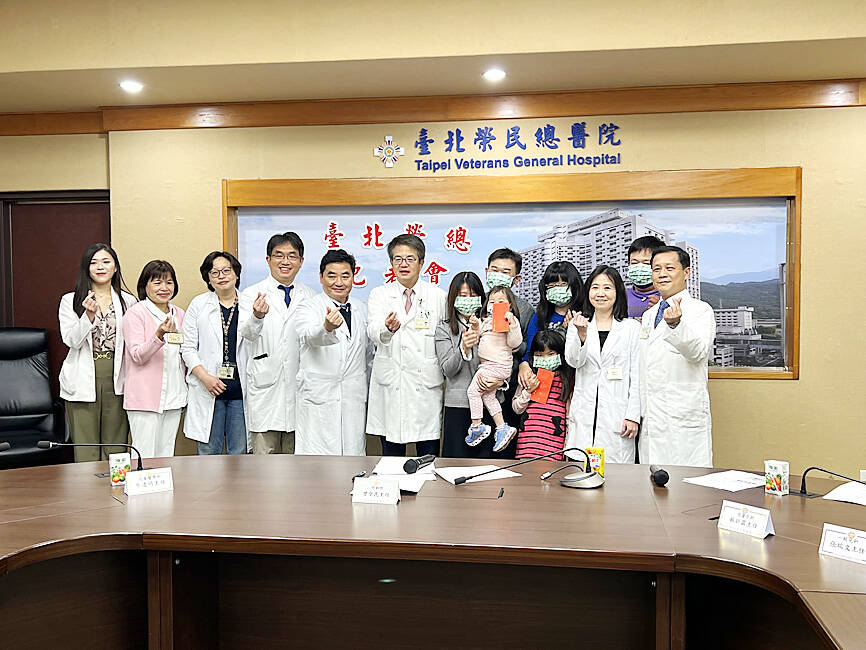Surgeons overcame several obstacles to successfully complete an organ transplant surgery for a three-year-old with inherited kidney disease, Taipei Veterans’ General Hospital said yesterday.
The patient, a girl surnamed Hsu (許), was diagnosed with polycystic kidney disease, a rare genetic disorder, at birth, the hospital told a news conference.
She has taken medication and had dialysis daily since she was two, and the condition limited her growth, it said, adding that at 86.3cm and 11.5kg, she is shorter and lighter than most other children her age.

Photo: CNA
Pediatric Surgery Division director Tsai Hsin-lin (蔡昕霖) said that most children who need a kidney transplant have inherited urinary system abnormalities, glomerulonephritis, acute kidney damage or other genetic disorders.
However, dialysis can cause delays in physical and neurocognitive development in young children, Tsai said.
As their bodies are so small, surgery on the urinary system of children with chronic kidney disease is more complicated, but if they do not get a kidney transplant before adulthood, the stunting of their growth might worsen, leading to learning disabilities, uremia, anemia, or even acute stroke or heart attack, he said.
Getting a transplant is a race against time, he added.
Another issue is that most kidney donors are adults, Tsai said.
After waiting a year for a compatible kidney from a donor who weighed 57kg, the big challenge for the surgical team was how to implant a 12cm-long kidney into Hsu’s abdominal cavity, which was only about 20cm long, he said, adding that the organ they removed was 8cm long.
The team had to precisely calculate the dimensions of Hsu’s abdominal cavity and the operation took seven hours, he said.
The surgeons removed the damaged kidney, moved her large intestine and duodenum to the left to make room for the donor kidney and connected blood vessels to it to prevent tubular necrosis, he said.
The team also reported the successful cases of a nine-year-old child, surnamed Chen (陳) and four other kidney transplants involving children since August 2020.
Pediatric Division director Chang Jei-wen (張瑞文) said that a kidney transplant is the best treatment for children with end-stage renal disease, as it not only has the best prognosis, but can also allow a young patient’s physical and cognitive growth to catch up with children of the same age.

NATIONAL SECURITY THREAT: An official said that Guan Guan’s comments had gone beyond the threshold of free speech, as she advocated for the destruction of the ROC China-born media influencer Guan Guan’s (關關) residency permit has been revoked for repeatedly posting pro-China content that threatens national security, the National Immigration Agency said yesterday. Guan Guan has said many controversial things in her videos posted to Douyin (抖音), including “the red flag will soon be painted all over Taiwan” and “Taiwan is an inseparable part of China,” while expressing hope for expedited “reunification.” The agency received multiple reports alleging that Guan Guan had advocated for armed reunification last year. After investigating, the agency last month issued a notice requiring her to appear and account for her actions. Guan Guan appeared as required,

A Vietnamese migrant worker yesterday won NT$12 million (US$379,627) on a Lunar New Year scratch card in Kaohsiung as part of Taiwan Lottery Co’s (台灣彩券) “NT$12 Million Grand Fortune” (1200萬大吉利) game. The man was the first top-prize winner of the new game launched on Jan. 6 to mark the Lunar New Year. Three Vietnamese migrant workers visited a Taiwan Lottery shop on Xinyue Street in Kaohsiung’s Gangshan District (崗山), a store representative said. The player bought multiple tickets and, after winning nothing, held the final lottery ticket in one hand and rubbed the store’s statue of the Maitreya Buddha’s belly with the other,

‘NATO-PLUS’: ‘Our strategic partners in the Indo-Pacific are facing increasing aggression by the Chinese Communist Party,’ US Representative Rob Wittman said The US House of Representatives on Monday released its version of the Consolidated Appropriations Act, which includes US$1.15 billion to support security cooperation with Taiwan. The omnibus act, covering US$1.2 trillion of spending, allocates US$1 billion for the Taiwan Security Cooperation Initiative, as well as US$150 million for the replacement of defense articles and reimbursement of defense services provided to Taiwan. The fund allocations were based on the US National Defense Authorization Act for fiscal 2026 that was passed by the US Congress last month and authorized up to US$1 billion to the US Defense Security Cooperation Agency in support of the

CLASSIFIED BRIEFING: The ministry said the special budget focuses on building a comprehensive defense system and strengthening the domestic defense industry The Ministry of National Defense yesterday released information on seven categories of weapons systems to be procured under a stalled NT$1.25 trillion (US$39.57 billion) special defense budget, including precision artillery, long-range missiles, air defense anti-tank missiles and more than 200,000 uncrewed aerial vehicles (UAVs). The Executive Yuan approved a draft version of the budget on Nov. 27 last year and submitted it to the legislature for review. The legislature’s Foreign Affairs and National Defense Committee yesterday invited Minister of National Defense Wellington Koo (顧立雄) to deliver a classified briefing and answer questions at a closed-door session. Koo said he hoped to provide lawmakers